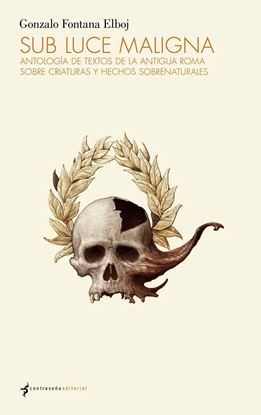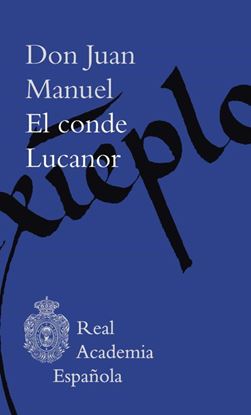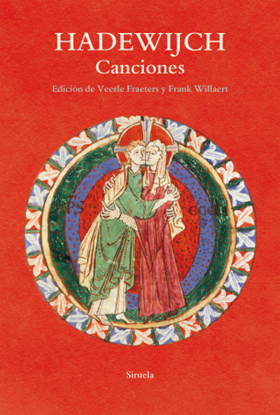

SUB LUCE MALIGNA. ANTOLOGIA DE TEXTOS
Esta antología de textos, pertenecientes a todos los géneros y épocas de la literatura latina, ofrece una compilación de pasajes relativos al oscuro y abigarrado catálogo de personajes y fenómenos sobrenaturales (espectros, casas encantadas, licántropos o muertos vivientes, entre otros) que poblaban los temores y las fantasías de la Roma de la Antigüedad, un asunto poco frecuentado por los manuales históricos al uso, más dados a reflejar una imagen augusta y estereotipada de aquella civilización. En el libro se dan cita casi todos los grandes autores de las letras latinas, como Virgilio, Horacio, Séneca, Ovidio o Cicerón, pero también otros menos conocidos, como Floro o Valerio Máximo. La antología incluye, además, una pequeña selección de textos anónimos en soporte epigráfico —cultos unos, populares otros—, entre los que cabe destacar una serie de maldiciones y hechizos amorosos, que sorprenderán seguro a buena parte de los lectores.
1,350
EL CONDE LUCANOR (RAE)
El volumen 5 de la BCRAE presenta la obra más conocida de Don Juan Manuel, El conde Lucanor (1335), colección de cincuenta ejemplos, tres colecciones de proverbios progresivamente más complejos y un tratado de doctrina cristiana.
La unidad de esta obra se debe, por un lado, a su propósito didáctico, de educación de los nobles de su tiempo, y por otro a la constante presencia de dos interlocutores, el conde Lucanor y su ayo Patronio, quien aconseja, a través de los distintos procedimientos didácticos a su disposición, el saber teórico y práctico que necesitaba reunir un aristócrata de su tiempo, y con él cualquier lector u oyente del libro.
1,350
HADEWIJCH CANCIONES
Las cuarenta y cinco canciones de Hadewijch publicadas en este libro deben situarse en la cima de la creación lírica medieval. Tratan acerca del amor, Minne, y lo hacen de un modo nuevo, porque el amor de Hadewijch es amor a Dios, pero expresado según el estilo de los poetas del amor profano, trovadores y Minnesänger. Esta combinación genera una profunda sensación de extrañeza que embarga por la belleza de sus versos en los que dominan potentes imágenes destinadas a visualizar un sentimiento cuya vehemencia está más allá de toda mesura. Es la furia del amor.
Nada sabemos de Hadewijch, salvo lo que puede deducirse de su obra compuesta, además de estas Canciones, por treinta y una cartas en prosa, catorce visiones y dieciséis poemas rimados, que la tradición manuscrita nos transmite en su totalidad como una edición cuidada por su misma autora, algo muy raro en la Edad Media. Hadewijch vivió en la primera mitad del siglo XIII en Brabante, una encrucijada lingüística como se pone de manifiesto en estas Canciones en vulgar, brabantino o neerlandés, en las que aparecen elementos románicos y germánicos. Era una «mujer religiosa» fuera de la orden monástica, una beguina, y maestra de beguinas, según se desprende del tono didáctico de toda su producción, que busca sobre todo ofrecer una orientación espiritual. Su obra deja traslucir una elevada cultura por la presencia tanto de teólogos latinos como Guillermo de Saint Thierry o Ricardo de Saint-Victor, como de la tradición trovadoresca, lo que permite suponer que su depurada técnica musical y poética debió adquirirla en un castillo donde imperara un refinado ambiente cortesano.
1,350
MANSFIELD PARK (AUSTEN)
Mansfield Park ocupa el centro exacto de la producción novelística de Jane Austen. Asentada como autora tras los éxitos de Sentido y sensibilidad y Orgullo y prejuicio, exhibe un estilo propio y reconocible, basado en el fino uso dela ironía y del retrato de personajes, pero ya se perciben el desencanto y la madurez de Persuasión.
El personaje de Fanny es uno de los más fascinantes y complejos de toda la obra deAusten, y dota a la novela de una profundidad que parece anticipar el realismo y el naturalismo de la segunda mitad del siglo XIX. Todo ello hace de MansfieldPark un clásico de las letras inglesas que bien merece una relectura.
1,350
DESCRIPCION DE CHINA
La "Descripción de China" de Matteo Ricci es considerada una de las obras más importantes acerca de la civilización, filosofía, historia, costumbres y geografía de China, tanto por el rigor de sus fuentes literarias como por la riqueza y autoridad de las orales, en especial los literatos chinos con los que el jesuita italiano tuvo trato. Primero de los cinco libros de su prolífica "Historia de la introducción del cristianismo en China" (tambien conocida como "Commentarj della Cina"), la "Descripción" es un trabajo etnográfico que cabe hoy enmarcar en el ámbito de las disciplinas que estudian los puentes culturales entre Europa y Asia, particularmente con el Lejano Oriente y China. Ricci consigue presentar a los lectores occidentales una China comprensible, pero que representa al mismo tiempo un desafío para la cartografía europea de los saberes.
1,350
SEGURANT
Segurant abandona su tierra natal, la Isla Ignota, para reunirse con el Rey Arturo y desafiar a sus paladines. A lo largo de su camino, gana innumerables torneos, despertando la admiración de los caballeros de la Mesa Redonda. Pero dos hechiceras, Morgana y Sibila, conjuran la imagen de un dragón que escupe fuego por la boca, y Segurant se lanza en su persecución. Las extraordinarias aventuras de este caballero de la Mesa Redonda que habían caído en el olvido durante siglos han sido redescubiertas ahora por Emanuele Arioli, un joven medievalista que recorrió las bibliotecas de toda Europa en busca de los manuscritos de esta historia del ciclo artúrico. Tras más de diez años de investigación, Emanuele Arioli presenta ahora el texto de esta novela perdida por primera vez en español. Con ilustraciones de los manuscritos originales, Segurant es una narración inédita que se revela como un cruce de leyendas y culturas, y como uno de los grandes acontecimientos literarios de este siglo.
1,350














